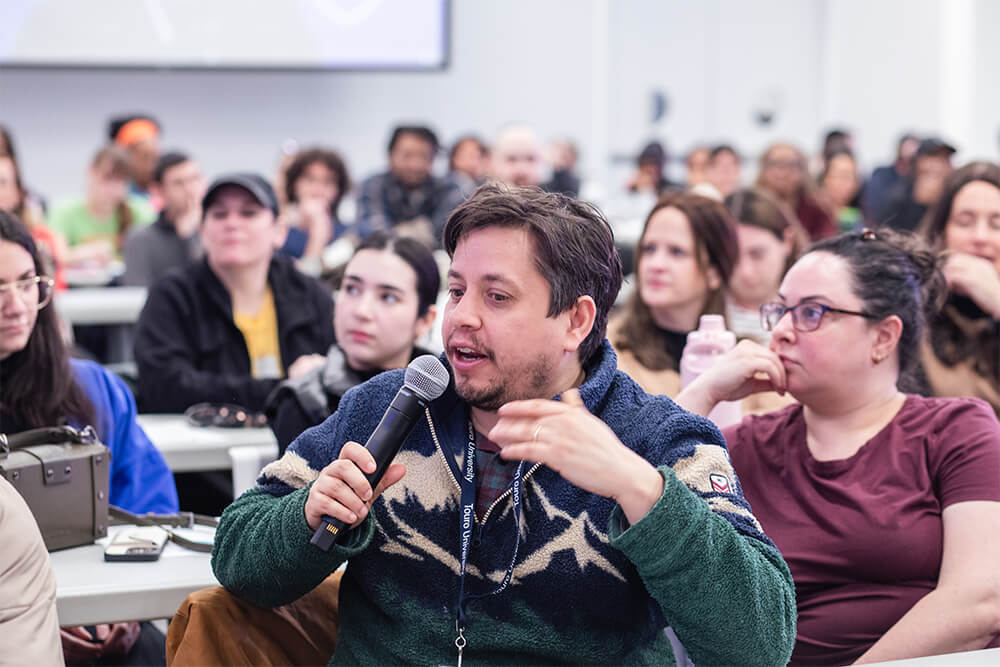The Impact of Social Media on Mental Health Professionals
Students and Faculty at Touro Graduate School of Social Work Address Social Media at 10th Annual Community Day

Students and faculty members from the Touro University Graduate School of Social Work (GSSW) gathered to discuss the impact of social media on their own mental health and on society as a whole at the 10th Annual “Community Day” event.
More than 250 students joined in person and by video conference, along with faculty, staff and administrators at GSSW to address "The Impact of Social Media on Clients' and Society's Mental Health."
“Most people have very mixed feelings about the positive and negative impact of social media use,” said Steven Tzvi Pirutinsky, Ph.D., associate professor at GSSW. Pirutinsky presented findings from a survey he conducted of GSSW’s social work students.
Among the most important findings, he said, was the high level of social media use (71% are frequent users) among the students, and that students are very concerned about control over their information, privacy, and professional boundaries.
Nearly 70% of students said that social media has a mostly negative effect on people. Though when they talked about the effect of it on themselves, only 29% said it was mostly negative.
“People tend to hold more positive beliefs about themselves, that they can handle things appropriately,” said Pirutinsky. “Yet when you ask more questions about specific concerns, they begin to recognize the challenges of using social media.”
Some of the specific negative effects students reported were feeling like their friends are leaving them out of things (78%), feeling worse about their life (66%), and feeling pressure to post content that gets lots of comments or likes (79%).
Students who struggled with anxiety themselves were more likely to report negative effects of social media. They did report some positive effects as well, including that they felt more accepted (67%) and felt that they had people who could support them through tough times (53%). Social work students were very concerned about their privacy and how they would navigate boundaries between themselves and their clients.
Social Media Presents Challenges and Opportunities
“The primary takeaway is that social media is a mixed bag and presents both opportunities and challenges for social workers,” said Pirutinsky. “It needs a mindful, careful and professional approach to manage those risks and reap those benefits.”
Other people who presented at the event included Folusho Otuyelu, Ph.D., LCSW, associate professor at GSSW, who spoke about the confluence of the pandemic, children's development and social media. Otuyelu discussed the importance of play and real-life interaction with others in a child’s development, especially for young children.
“Children should be playing outside, getting dirty and engaging with each other, which are things social media cannot provide,” she said. “This helps develop creativity and free association.”
The final presentation was from Nancy Gallina, Ph.D., LCSW, dean of GSSW, discussed some of the pitfalls of using social media from examples in her own practice with children, teens, adults and families. She talked about parenting and privacy issues with using apps to monitor children’s whereabouts, and dilemmas that arise when social workers are socially connected to clients.
"I had a client who reported she was no longer drinking, but I could see a Venmo exchange with one of her friends that referenced buying cocktails,” she said, facing the dilemma of what to do with that information.
The program ended with a group discussion over dinner about whether social media is a force for good in their lives and in society or a source of anxiety and stress.
“I truly appreciated the depth of information and the real-world applicability of the topic,” said Mitchell Statfeld, a graduate student who attended the event.

